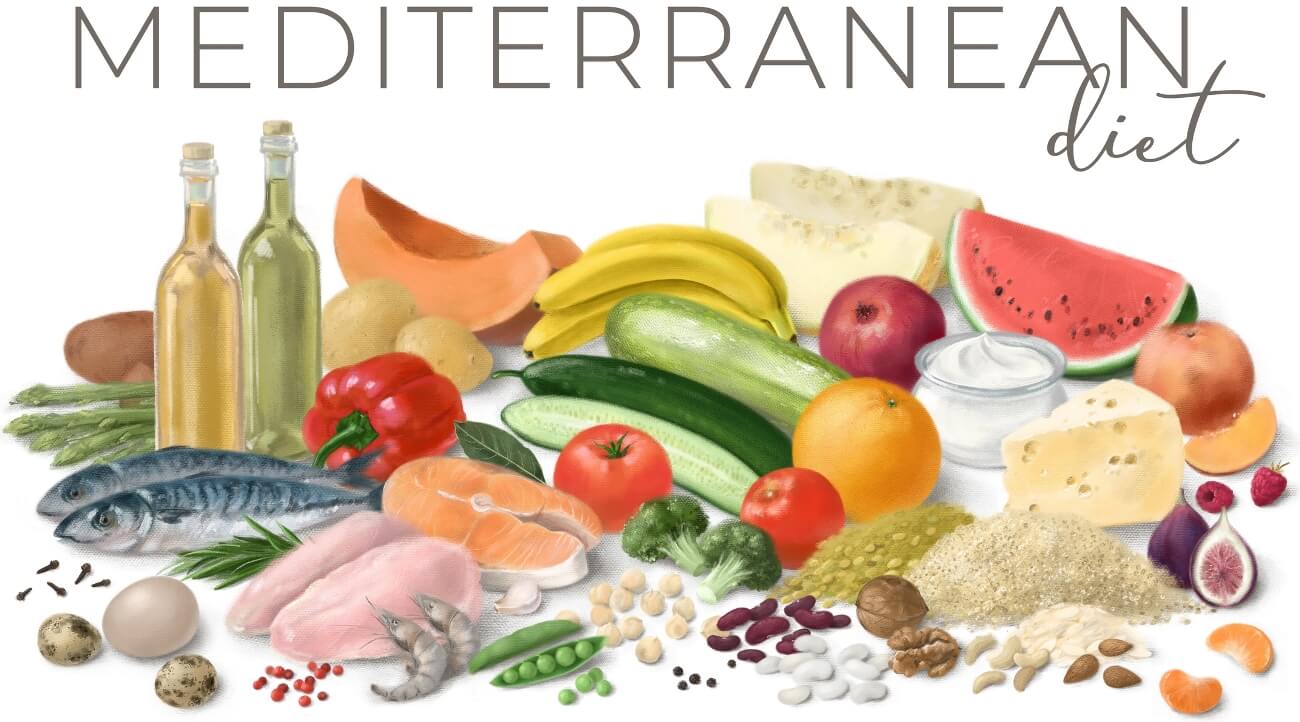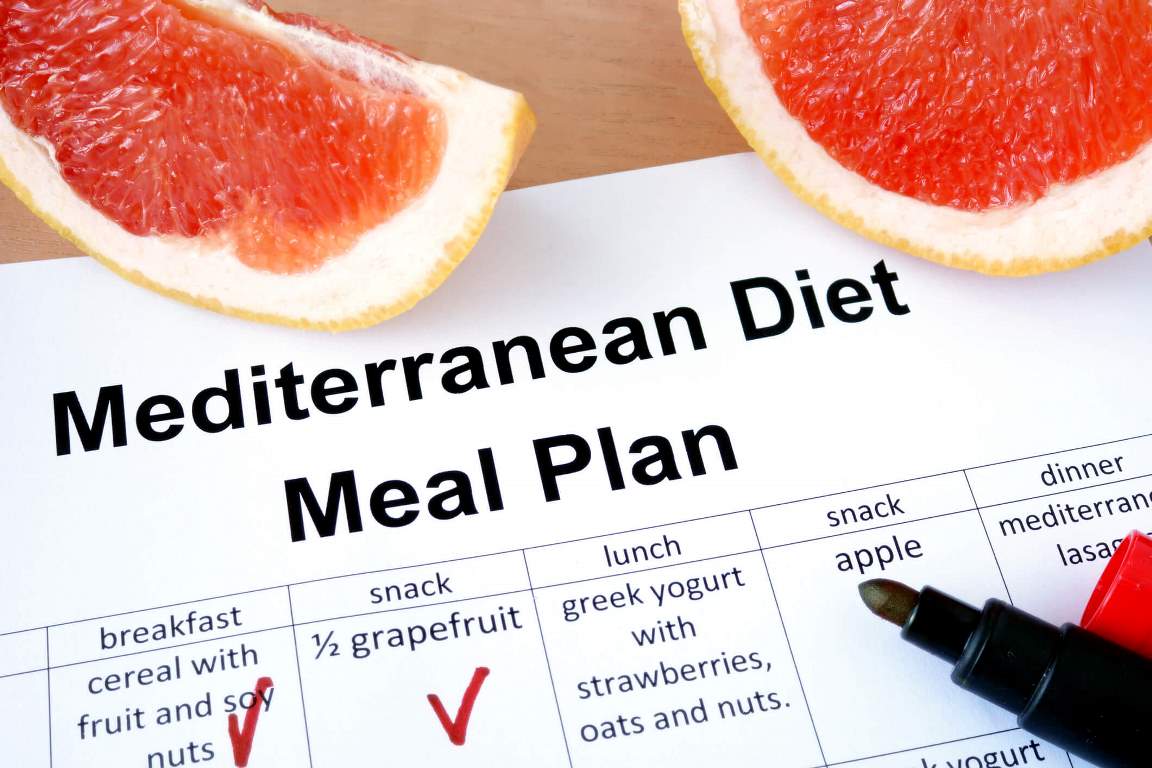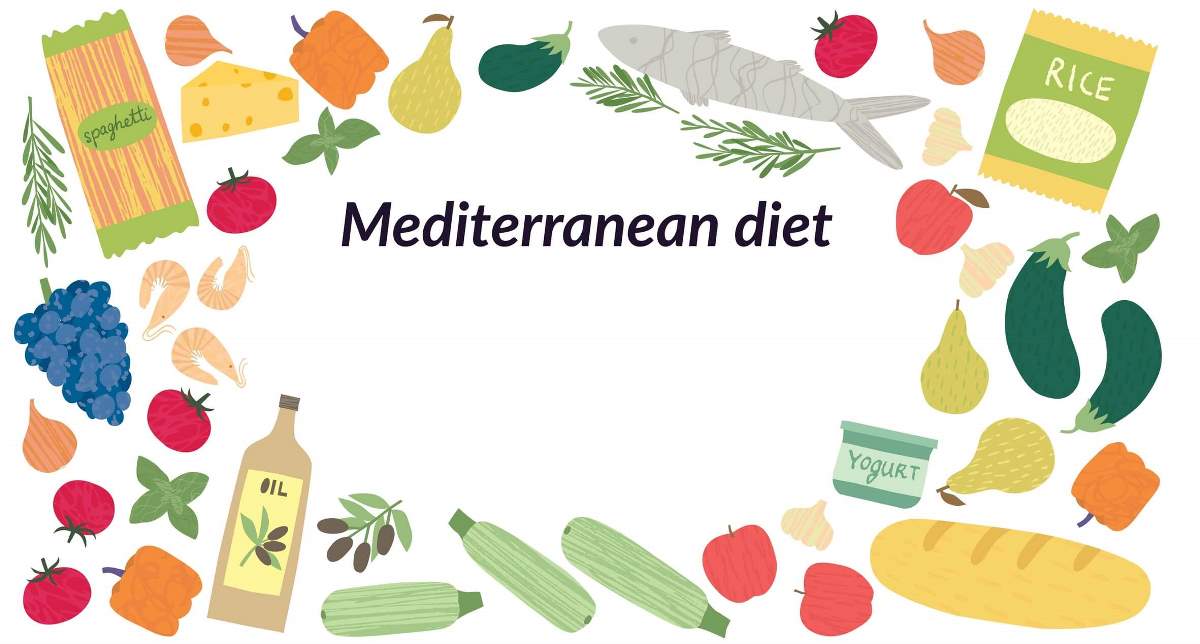Introduction
Diets have been around for ages. There are fads and then there are healthy diets. But a lot of people still think of diets in a very different way.
Strict diets may involve giving up a meal here, eating nothing there and generally letting your body live with a little less. But to give your body what it needs, experts say the best diet for you to follow is probably the Mediterranean diet.
The Mediterranean diet is packed full of good-quality, healthy foods.
It's low in fat and high in vegetables, fruit and whole grains. The diet is also lower in saturated fat and contains very little red meat. Scientists say its well-documented benefits include lower cholesterol, lower risk of heart disease, reduced risk of Type 2 diabetes and a lower risk of several types of cancer.
And it might just be the perfect diet for your sleep!
What Is The Mediterranean Diet?

The Mediterranean diet originated in the early 1900s and is defined by an emphasis on fruits, vegetables, nuts, beans, whole grains, fish, poultry, olive oil, and low-fat dairy products and meat. Some of the foods that the Mediterranean diet emphasizes include tomatoes, herbs, olives, fruits, as well as grains, fish, and nuts. People who follow a Mediterranean diet typically eat these foods, on average, about once a day, five or six times a week.
ALSO READ : Facts About the DASH Diet (Without the Hype)
Is The Mediterranean Diet Healthy?
There is no evidence that the Mediterranean diet is better for heart health or weight loss than any other diet.
 An Israeli study issued in the Journal of the American College of Cardiology found no significant difference between the Mediterranean diet and a low-fat diet, which is typically recommended for heart health.
An Israeli study issued in the Journal of the American College of Cardiology found no significant difference between the Mediterranean diet and a low-fat diet, which is typically recommended for heart health.
People with diabetes or who are overweight may benefit from adopting the Mediterranean diet as part of a heart-healthy approach, but the evidence is limited.
The diet is not gluten-free or vegan, so people with these conditions may have a more challenging time adopting this diet because of specific requirements for ingredients and cooking methods.
Some Benefits Of The Mediterranean Diet

The following benefits of the Mediterranean diet are backed up by scientific research:
● Improves Heart Functions. Some evidence suggests that people with heart disease or risk factors may benefit from the Mediterranean diet. A study printed in JAMA Cardiology found that adopting a Mediterranean diet may lower cardiovascular risk factors, such as blood pressure, diabetes, and inflammation. The researchers evaluated the diet records of 8,000 people for approximately 15 years.
● Lowers Diabetes Risk. Researchers from the University of Basel studied roughly 18,000 people aged 55 years or older. They found that the Mediterranean diet was associated with decreased risk of developing type 2 diabetes.
In one study, scientists assessed the diet of about 60,000 people in Denmark between 1990 and 2000. They found that people who stuck to the Mediterranean diet had a lower risk of developing diabetes than those who did not.
A recent study published in The Lancet analyzed data from multiple cohorts of about 2.7 million people, including 5,000 people with diabetes.
 An American Heart Association study found that people who adhered to the Mediterranean diet had a lowered risk of heart disease than those who ate a traditional Western diet high in meat, potatoes, and fats.
An American Heart Association study found that people who adhered to the Mediterranean diet had a lowered risk of heart disease than those who ate a traditional Western diet high in meat, potatoes, and fats. 
One possible mechanism for the Mediterranean diet's heart benefits is its emphasis on fats and protein, which the AHA believe may reduce inflammation.
● Lowers The Risk Of Type 2 Diabetes. A Mediterranean-style diet has also been shown to reduce the risk of type 2 diabetes, suggesting a reduction in the overall diabetes risk. High blood sugar can have a harmful effect on blood vessels and increase the risk of heart disease, stroke, and blindness.
● Lowers The Risk Of Dementia. A study in the American Journal of Clinical Nutrition found that people with the Mediterranean diet were less likely to develop dementia. People who followed a Mediterranean diet had a 20 per cent lower risk of developing dementia, while those who did not have a 27 per cent greater risk of developing dementia.
● Lowers The Risk Of Cancer. A 2011 study from the European Prospective Investigation into Cancer and Nutrition analyzed more than 50,000 people from nine countries in western Europe.
Those who adhered to the Mediterranean diet were 12 percent less likely to develop stomach cancer, 4 percent less likely to develop stomach cancer, and 17 percent less likely to develop colon cancer than those who did not follow the diet.
While a Mediterranean diet may help reduce cancer risk, there is not enough research to establish a definitive link.
● Lowers Blood Pressure. Although the Mediterranean diet has not been studied as extensively as its namesake, studies have shown that it may lower blood pressure.
A 2015 study published in The Lancet studied 8,855 people with elevated blood pressure, 18 per cent of whom were overweight or obese.
The researchers found that those who adhered to the Mediterranean diet had a 17 per cent decrease in their systolic blood pressure, and a 7 per cent decrease in diastolic blood pressure, compared to those who did not observe the diet.
ALSO READ : Your Microbiome: Key To Weight Loss
● Lowers Cholesterol. Researchers have found evidence that a Mediterranean diet may reduce LDL (bad) cholesterol levels and increase HDL (good) cholesterol levels. This could help reduce the risk of cardiovascular disease, though more research is needed to confirm the link.
The diet's cholesterol-lowering effect appears to be mainly due to the absence of red meat and dairy products. Instead, fruits and vegetables are a popular part of the Mediterranean diet. Fruits and vegetables are a popular part of the Mediterranean diet.
 Researchers estimate that people with a Mediterranean diet consume 3,200 to 5,800 more calories per day.
Researchers estimate that people with a Mediterranean diet consume 3,200 to 5,800 more calories per day.
Eating fish five times per week may reduce the risk of heart disease by 25 per cent. Aim for 8 ounces (oz) of fish a week. Fish can include seafood like tuna, salmon, or mackerel and oily fish like herring, sardines, and anchovies.
How Does Mediterranean Diet Help You Lose Weight?

The Mediterranean diet, which has been linked to a lower body mass index (BMI), is also highly nutritious, containing lots of fruits and vegetables and healthy fats from fish and olive oil. To reap the maximum benefits, it's important to focus on living an active lifestyle and following a well-planned diet and daily exercise regime.
The diet's association with weight loss is thought to be linked to its content of monounsaturated fats and health-boosting antioxidants. Research tells that people who follow a Mediterranean diet have a lower BMI and a reduced threat of heart disease and type 2 diabetes. It's thought that weight loss is due to eating smaller amounts of food while choosing healthier alternatives.
ALSO READ : Get The Skinny On hCG vs. Popular Weight Loss Methods
What's The Mediterranean Diet Really Like?
It offers an ideal balance of fats, carbohydrates, proteins, fibre and the vitamins and minerals we need to stay healthy. It consists of lots of fresh produce, fish and other low-fat, low-glycemic-index foods. Beans, lentils, vegetables and whole grains are essential, as are fruits such as blueberries, avocados and dark chocolate. The diet is also extremely healthy for omega 3, a fatty acid that supports cardiovascular health and cognitive function.
How Do You Eat The Mediterranean Diet?

Cutting out unhealthy, high-fat foods like meat, butter, and sugary desserts is the first step to implementing a Mediterranean diet. Still, there are plenty of other tasty ways to incorporate it into your diet, such as sipping on a glass of cold-pressed olive oil during your breakfast. Eating whole, unprocessed foods and choosing healthy options over fast foods will help you maintain energy throughout the day. If you're making a Mediterranean-inspired dinner, you can make sure you include a serving of vegetables with each meal.
What Foods Are Not Permitted On The Mediterranean Diet?
Foods not allowed on the diet include:
● Some studies have shown dairy products can interfere with the effectiveness of statins, which are used to treat high cholesterol. While dairy products are best avoided, some dairy foods may be allowed.
● Nuts and seeds are great sources of fiber, which is also essential on a diet that is low in fat and calories. However, consuming too many raw nuts and seeds can cause inflammation and affect cholesterol. People who are allergic to nuts and seeds can have an allergic reaction.
● Sugar is not to be included in the diet, as sugar stimulates the body's craving for fat, thus adding calories to a diet that has been controlled to be low in calories.
● Beets are high in natural sugar, leading to feeling hungry more often.
● If people with diabetes, heart disease, kidney disease, or gallstones choose to eat beets, they are advised to avoid canned versions.
Another food that is often banned on the diet is grain products. This is because grain products are highly processed and come with a lot of calories.
ALSO READ : Reset Your Metabolism and Heal Yourself
How Long Does It Take To Notice Results From A Mediterranean Diet?

The Mediterranean diet offers an easy way to lose weight and lose inches without the need to diet or exercise. However, according to the Mediterranean diet website, it will take about 12 months to see the full results of following the Mediterranean diet plan.
ALSO READ : Turn the Tables on How You Eat
What Are The Disadvantages Of The Mediterranean Diet?

Unfortunately, the advantages and disadvantages of the Mediterranean diet vary from culture to culture. Some of the most prominent disadvantages are:
In some parts of the Mediterranean, the consumption of red meat is severely restricted or outright forbidden, particularly among non-vegetarians. Likewise, the consumption of highly processed foods (especially red meat and dairy) is discouraged in favor of less processed foods and more nutrient-dense foods. Other locales in the Mediterranean have adopted an extremely high fat intake, which is actually associated with a higher incidence of disease. The data clearly shows the pros and cons of different parts of the Mediterranean diet.
ALSO READ :Move from Sugar Addiction to Sugar-Free Naturally
On the positive side, Mediterranean cultures are a great source of vegetarian foods, so if you plan to make the Mediterranean diet part of your health plan, you can feel fairly confident in finding many of your favorites at a good local market or a nearby Indian restaurant.
Despite these lapses, there is still a good possibility that you could make the Mediterranean diet part of your health plan. You can use the Mediterranean diet to take in a good diet rich in vitamins and minerals, plenty of protein, good vegetables, and plenty of beans and legumes. Because the Mediterranean diet is based on healthy eating patterns, it is also a good choice for anyone who isn't yet eating a healthy diet.
 If you are going through a challenging time with your Mediterranean diet plan, it's time to get on board the most natural weight loss solution -- Nutra Pure Homeopathic hCG weight loss drops.
If you are going through a challenging time with your Mediterranean diet plan, it's time to get on board the most natural weight loss solution -- Nutra Pure Homeopathic hCG weight loss drops.
Why use Nutra Pure Homeopathic hCG weight loss drops To Lose Weight?
 Nutra Pure Homeopathic hCG weight loss drops help you lose weight most naturally. These drops are very effective in managing your weight, and once you take it, it's safe to take them every day. There are zero side effects, and you will start feeling good and burning more fat, and your body will look and feel fantastic!
Nutra Pure Homeopathic hCG weight loss drops help you lose weight most naturally. These drops are very effective in managing your weight, and once you take it, it's safe to take them every day. There are zero side effects, and you will start feeling good and burning more fat, and your body will look and feel fantastic!
These Nutra Pure Homeopathic hCG weight loss drops help you burn up to 500 calories an hour. They also help you balance the electrolytes in your body.
● It provides energy.
● It also restores your digestive system and restores your health.
● It has natural and safe side effects that help you lose weight naturally.
● It helps you produce endorphins that help you feel happier and vibrant.
● It also boosts your metabolism and enables you to burn up the extra fat in your body.
● These drops have no side effects, and they have been shown to be safe and effective.
 Manufactured in the USA, Nutra Pure Homeopathic hCG weight loss drops have been studied and tested by experts in homeopathic medicine, to be safe and effective.
Manufactured in the USA, Nutra Pure Homeopathic hCG weight loss drops have been studied and tested by experts in homeopathic medicine, to be safe and effective. 
Nutra Pure Homeopathic hCG Weight Loss Drops online can be used to lose weight as well as build up your health.
As a water-based colloidal and mineral solution, Nutra Pure Homeopathic hCG drops optimizes your body's metabolism. Nutra Pure Homeopathic hCG Weight Loss Drops are manufactured from 100% natural substances and are not contaminated with toxins or chemicals, unlike pharmaceutical drugs.
These are free of any side effects and are highly effective in regulating your weight and losing it naturally. These drops have been demonstrated to be an effective homeopathic weight loss solution for weight loss and fat loss.
It's no surprise that there are so many triumphant weight loss stories with Nutra Pure Homeopathic hCG weight loss drops, and the success stories are still pouring in. So banish the thoughts of embarking on tough and expensive diets and say hello to Nutra Pure Homeopathic hCG weight loss drops today!
ALSO READ :About Nutra Pure HCG Drops
References:
https://www.healthline.com/nutrition/mediterranean-diet-meal-plan
https://www.medicalnewstoday.com/articles/324221
https://health.usnews.com/best-diet/mediterranean-diet
https://www.hopkinsmedicine.org/health/wellness-and-prevention/take-your-diet-to-the-mediterranean
https://www.heart.org/en/healthy-living/healthy-eating/eat-smart/nutrition-basics/mediterranean-diet
https://my.clevelandclinic.org/health/articles/16037-mediterranean-diet
https://modifyhealth.com/pages/what-is-the-mediterranean-diet
https://www.emedicinehealth.com/foods_not_allowed_on_the_mediterranean_diet/article_em.htm





